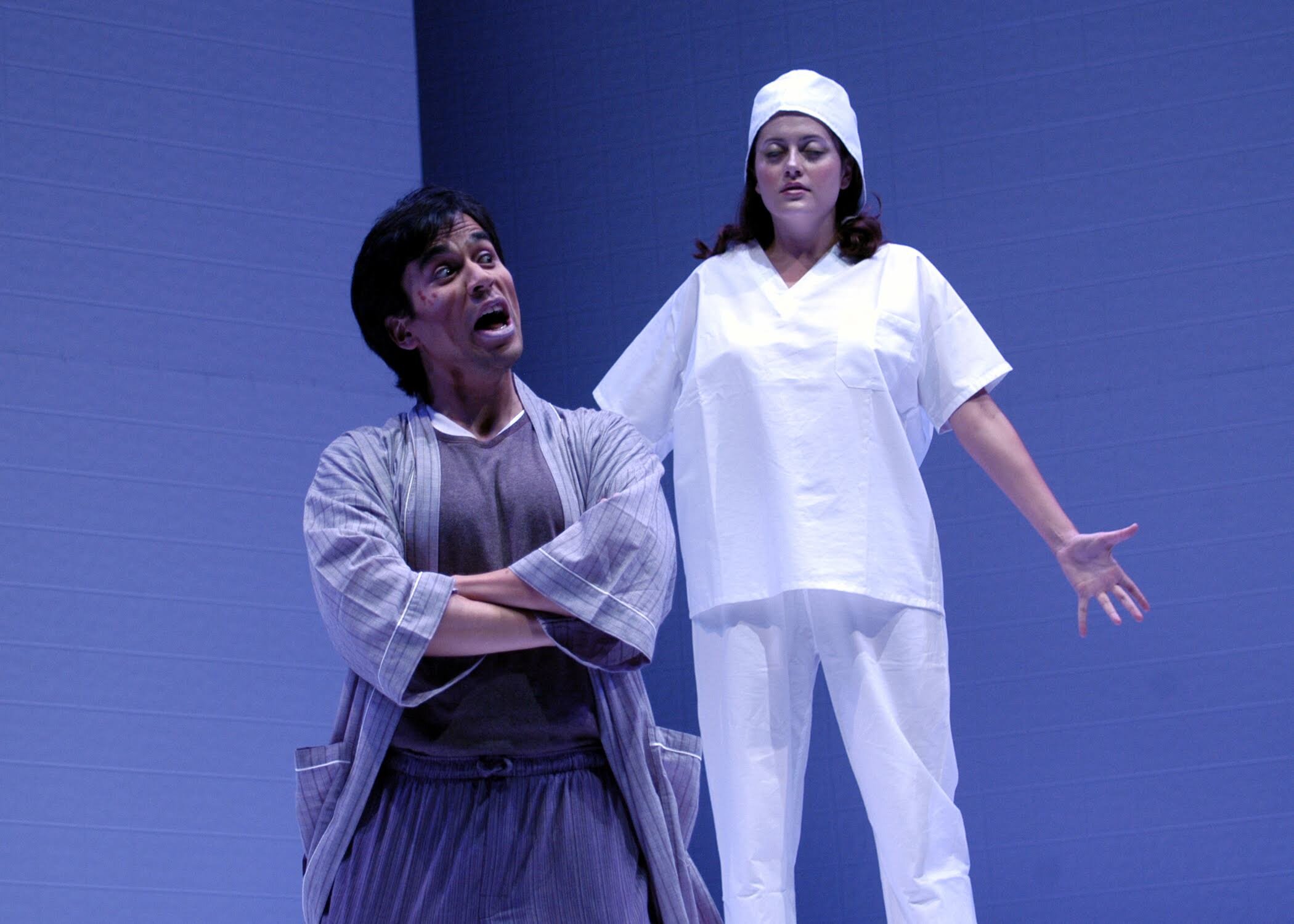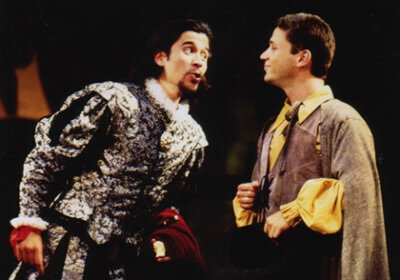OPERA REVIEWS
Fritz/Pierrot in Korngold’s Die tote Stadt with Odyssey Opera:
"And in the most important of these featured roles, Thomas Meglioranza ... with his lyric aplomb—he was an unforgettable presence as Chou En-lai in Opera Boston’s landmark 2004 production of Nixon in China and is familiar for his work with the Mark Morris company—was an inspired choice for Fritz, the theater company’s Pierrot. His exquisite “Tanzlied” waltz, about the “intoxication and misery” of the past, with its “Eastern” musical introduction and accompaniment by women’s chorus, is the second best-known aria from Die tote Stadt, and he nailed it."
--Lloyd Schwartz, New York Arts
"Baritone Thomas Meglioranza was another standout, with an absorbing account of Pierrot's Act 2 song that stole, if not the whole act, at least the extended party scene in which it appears."
--The Arts Fuse
"...his scene stealing little serenade delectably seductive."
--Parterre Box
"The stand-out was Thomas Meglioranza, who sang the haunting 'Pierrots Tanzlied', essentially a Viennese salon song ... Meglioranza captured the song's profound melancholy."
--Berkshire Fine Arts
"Baritone Tom Meglioranza sang powerfully and expressively, utterly musically and emotionally connected to the text, proving the oft-repeated, seldom-followed stage dictum that 'less is more.'"
--The Boston Musical Intelligencer
"Thomas Meglioranza as the actor Fritz ... stood out among the rest of the capable cast."
--The Boston Globe
Prior Walter in Peter Eötvös’ Angels in America with Opera Boston:
"as Prior Walter, afraid of death and eager to live, Thomas Meglioranza was immensely touching, and even suggested Prior's mordant, all-seeing wit."
--Richard Dyer, The Boston Globe
"Thomas Meglioranza sang the pivotal role of Prior Walter with humanity, deep sensitivity, and stellar instincts."
--Wayman Chin, Opera News
"Thomas Meglioranza was touching as Prior Walter."
--Bernard Holland, The New York Times
"baritone Thomas Meglioranza has the presence, passion and voice to sustain the central character of Prior Walter."
--Frank Rizzo, Variety
"Thomas Meglioranza, a New York-based baritone well known for his acumen in both early and contemporary music, was altogether exceptional as Prior, vividly projecting self-pity, terror, rage and hope, and comfortably sashaying in fuschia drag during one spectral appearance."
--Steve Smith, Musical America
"Thomas Meglioranza, the impressive Chou Enlai in Nixon in China, excels again as the betrayed and visionary Prior."
--Boston Phoenix
Chou En-lai in John Adams’ Nixon in China:
"Baritone Thomas Meglioranza delivers Chou En-lai's interior music with quiet rapture."
--Richard Dyer, The Boston Globe
"As Nixon and Chinese Premier Chou En-lai, Andrew Schroeder and Thomas Meglioranza matched the celebrated achievements of Boston favorites James Maddalena and Sanford Sylvan in the original."
--Boston Herald
"Thomas Meglioranza's Chou looked too young, but his plush voice and rapt concentration made his final pronouncements chilling."
--Boston Phoenix
"The singers were excellent. Thomas Meglioranza (Chou) used his mellow voice to maximum advantage."
--Opera News
"Andrew Schroeder who made his debut with Opera Boston as Nixon and Thomas Meglioranza who made his debut as Chou En-lai each delivered strong performances and make a strong case for composers to write more compelling baritone leads."
--Opera Online
Peter Maxwell Davies’ Eight Songs for a Mad King:
Davies’ 1969 tour de force lends the lead role to a necessarily game, flexible baritone. This performance had one in Thomas Meglioranza. His virtuosic part, teetering between primal sounds, Modernist gestures and Baroque swipes, ranges from abstraction to lamentation to personal implosion and requires him to steal and then smash a violin (belonging to the gamely befuddled Bing Wang). Meglioranza embedded a fine madness."--The Los Angeles Times
"The fine baritone Thomas Meglioranza fully inhabited this daunting role, in which the king must both convey hints of his former dignity while prowling the stage (here in white pajamas) and screeching in falsetto about God and kingdom and cabbages." --The Boston Globe
"The performance of “Eight Songs” was astounding, and especially the baritone, Thomas Meglioranza. The audience gave him five standing ovations."--Roger Bourland Writes About Music and Life
"Maybe the most remarkable individual achievement belonged to Thomas Meglioranza, who bellowed, shrieked, wailed, and recited his way through Peter Maxwell Davies’ seminal Eight Songs for a Mad King. . . [His] account of it was also spiked with pathos: when, at the end of the fourth movement, Meglioranza (as George) offered “I am weary of this feint. I am alone,” the affect was heartbreaking more than anything else. . . What Meglioranza’s full-throated performance did best was to humanize this, on these shores, much-maligned monarch. After all, behind the caricature and myth lived a disturbed, broken human being, and to be able to bring him to life as potently and compassionately as Meglioranza did is a significant artistic accomplishment."
--The Arts Fuse (Boston)
"This was very much a concert presentation, but it had all the requisite comedy and thrills of something more elaborate, primarily because of the stunning performance of baritone Thomas Meglioranza. Everyone in the audience lept to their feet after he finished, myself included. Much deserved!"--Frank's Wild Lunch
"I've never seen an audience give a standing ovation like that at a modern music concert."
--Audience Member
"The evening’s clear standout was Peter Maxwell Davies’ “Eight Songs for a Mad King.” Taking the instrumental configuration of Schoenberg’s “Pierrot” as a starting point, this work is a theatrical tour de force, both musically compelling and dramatically devastating. Baritone Thomas Meglioranza bent, coaxed and contorted his voice into the most versatile of instruments as he impersonated a demented King George III."--Ivory Dreams
"Last Tuesday, Green Umbrella did Eight Songs for a Mad King, and it’s hard to imagine a more enthusiastic audience response to such ferociously thorny music. People cheered themselves hoarse. Thomas Meglioranza, who played the afflicted monarch, had a lot to do with it: singing, shrieking, speaking, squeaking and crawling around stage and interfering with the sextet (at one point snatching Ms. Wang’s violin and smashing it to bits). The moments when he was permitted to sing, the loveliness came as a jolt--there was one moment when he tried to speak to a bird."--Silverlake Blvd.
Title role in Mozart’s Don Giovanni:
"Baritone Thomas Meglioranza took on the title role and triumphed. His saturnine good looks and athletic performance projected a Don of vigor and daring. There is no brooding in this outlook, only a search for another adventure."
--The Denver Post
"Slim and athletic, with saturnine features, Thomas Meglioranza took on Giovanni with a dark, masculine timbre. Even Aspen's notorious altitude and the physical demands of the role didn't faze the singer."
--Opera News
Aeneas in Purcell’s Dido and Aeneas:
"The cast was excellent. Thomas Meglioranza, as Aeneas, looked smarmy with a slicked-back ponytail, and his baritone was seductive."
--The Atlanta Journal-Constitution
"Thomas Meglioranza gives a thoughtful and sympathetic performance that sends a breath of fresh air blowing gently through the opera. His voice and confiding manner suggests from the start a soft hearted hero who really could win the heart of a widowed queen. And he shows considerable understanding of Purcellian declamations."
--Early Music (Oxford University Press)
"Thomas Meglioranza's Aeneas, sung in a warm medium-scale baritone, is consistently vivid."
--Opera Magazine
"[Meglioranza] sings and acts brilliantly, so this is also great musicmaking...takes great care in each passage to create a flesh-and-blood character. Thomas Meglioranza does the near miraculous by singing the role of Aeneas with genuine emotion and absolute credibility."
--Early Music America




